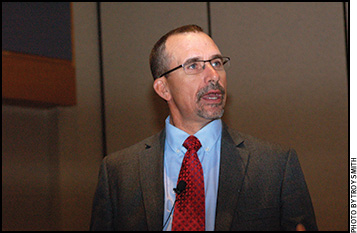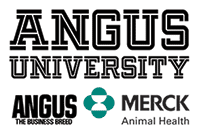
Veterinary Feed Directive and Beyond
Veterinarian says producers need to listen and prepare for new rules.
The matter has been discussed ad nauseam in veterinarian Randall Spare’s opinion, but he fears some livestock producers still don’t get it. They need to understand that once the veterinary feed directive (VFD) rule becomes effective in 2017, some widely used animal health management practices will become illegal. While producers and their veterinarians often bristle at the idea of increased regulation, Spare said an attitude adjustment regarding the use of antibiotics is warranted.

“I encourage you to step up and face the challenge to reduce antibiotic use in your operation by 50%,” stated Randall Spare, Ashland, Kan., veterinarian. To listen to Spare’s presentation, click the photo above or turn your browser to http://bit.ly/AC16-Spare-audio.
A large-animal veterinarian practicing in Ashland, Kan., Spare shared that opinion while discussing the coming VFD requirement with cattle producers attending the 2016 Angus Convention in Indianapolis, Ind. He reminded his audience that, as of Jan. 1, a VFD written by a licensed veterinarian will be required in order to obtain feed-grade antibiotics defined as “medically important.”
Practically speaking, the VFD rule means certain classes of antibiotics that also are used to treat humans can only be added to livestock feeds upon the order of a veterinarian with whom a producer has an ongoing professional relationship. The rule also prevents veterinarians from authorizing extra-label use of any feed-grade antibiotics to which the rule applies. For example, chlortetracycline (CTC) is an antibiotic whose future use in feed preparations will require a VFD.
Click here to watch an interview of Randall Spare The Angus Report
Coming in the wake of increased public scrutiny of livestock production practices, Spare said the VFD rule creates a new layer of oversight and a “triangle of communication” between a producer, veterinarian and feed supplier. All must meet recordkeeping requirements. Ultimately, though, the onus is on the vet.
“The rule holds us all accountable for our actions,” stated Spare, “but, at the end of the day, the veterinarian is responsible.”
Spare said there may have been too little oversight of medically important antibiotic use in some past situations. Now, all involved parties will be required to boost their applications of stewardship. In Spare’s opinion, that’s the upside of the VFD rule. He believes the objective of good stewards should be to use antibiotics only as a last resort.
“Have we ever used antibiotics as a crutch? Probably. Can we do things to mitigate their need? You bet,” offered Spare, encouraging producers to make management choices that improve and maintain the health status of their cattle herds, thus mitigating the risk of disease.
 Spare said attention to nutrition, low-stress handling, and appropriate and timely immunization should be included in every producer’s focus on stewardship. He urged producers to consider whether there were weak links in their management, and what might be done to strengthen their individual operations. He warned that even greater oversight of antibiotics, including injectable products, is likely in the future. Now is the time to prepare.
Spare said attention to nutrition, low-stress handling, and appropriate and timely immunization should be included in every producer’s focus on stewardship. He urged producers to consider whether there were weak links in their management, and what might be done to strengthen their individual operations. He warned that even greater oversight of antibiotics, including injectable products, is likely in the future. Now is the time to prepare.
“I encourage you to step up and face the challenge to reduce antibiotic use in your operation by 50%,” stated Spare. “Assess and address your current management and health practices, and make a plan.”
Spare’s presentation was one of the Angus University Workshops sponsored by Merck Animal Health Nov. 6 at the 2016 Angus Convention. To listen to his presentation or access his PowerPoint, visit http://bit.ly/AC16-Spare. For comprehensive coverage of the Angus Convention, including speaker summaries, links to the full presentations, photos, videos and more, visit www.angus.media/news/Angus-Convention.

Editor’s Note: Field Editor Troy Smith is a freelance writer and cattleman from Sargent, Neb.






